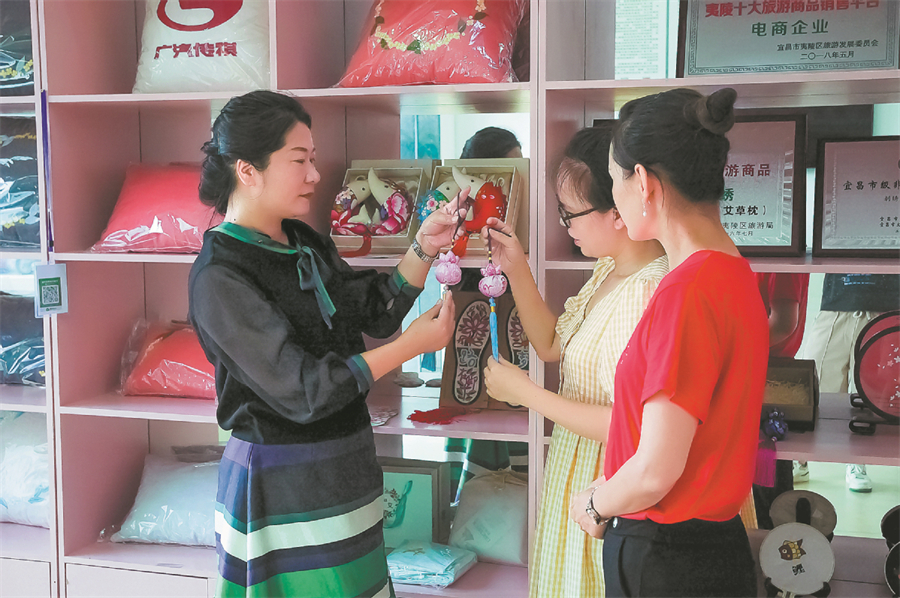Village stitches its way to success

Xie Rong (left) shows embroidery products made by a handicraft manufacturing base that she founded in Xujiachong village, Yichang, Hubei province. [China Daily]
Traditional embroidery technique kicks off revival in Three Gorges area
Nestled in the mountains by the Yangtze River, Xujiachong, a village in Yichang city's Yiling district in Hubei province, is located next to the Three Gorges Dam.
The village has a population of about 1,400, more than 1,200 of whom are migrants who moved here due to the construction of the dam.
Among the migrants is Xie Rong, who moved to Xujiachong in 1993 when she was 18.
Having witnessed the ups and downs of the village, Xie decided to start her own business in 2012 to improve not only her life, but also those of her fellow villagers.
Once the dam project began in 1994, Xujiachong residents didn't have to worry about their incomes, Xie recalled.
The project brought a large number of construction workers to the area, thus Xujiachong villagers easily made a living by renting houses to the workers, running restaurants or grocery stores, or taking jobs at the construction site.
But the large group of construction workers left after construction of the dam was completed in 2006, leaving many villagers feeling "at a loss", Xie said, adding that the situation prompted her to think of ways to better their lives.
In 2012, she began collecting cross stitch works made by the villagers and selling them to tourists visiting the dam. But their works were coolly received.
Xie then decided to turn to a traditional embroidery technique to give her products a distinctive feel. Called qianhua embroidery, the technique was once mastered by many locals.
"I remember seeing my grandmother doing qianhua embroidery when I was young. It was beautiful," Xie said.
She invited older villagers to teach her and others how to do qianhua. While learning the technique, she and her coworkers started embroidering their own objects, such as pillows and place mats.
After spending three "lengthy and painful" years perfecting their skills and exploring the market, Xie and her colleagues saw the business take a favorable turn. The sachets they made stuffed with ay tsao, a medicinal plant that has a special fragrance, became a popular product among tourists.
According to Xie, her company now provides qianhua embroidery training courses to people in both Xujiachong and neighboring villages, and has offered gig jobs to more than 100 locals by hiring them to make embroidery works.
But Xie's search for a better life didn't stop there.
Seeing people flock to visit the Three Gorges Dam during the National Day holiday in 2015, she saw another business opportunity.
Xie made a sign with her phone number advertising her village as a place where people can come dine and rest, and she posted it in the tourist area of the dam.
She soon received a flurry of calls from tourists asking her about meals and beds.
Surprised and unprepared, Xie rushed to find villagers who had spare rooms and whose homes were clean and tidy, and introduced tourists to them.
A female villager who had a number of spare rooms in her newly decorated house made 2,000 yuan ($276) for accommodating tourists during the holiday, according to Xie.
"She was so very happy," Xie said.
By that time, Xie had spent all her family's savings on the embroidery business. But her success encouraged her to embark on yet another venture.
In 2017, she built a four-story hotel in Xujiachong, which was the first hotel in the village. Inspired by Xie, other villagers opened their own hotels. There are now 38 hotels in the village.
Looking back on the past decade, Xie, who is now Xujiachong's Party chief, said that time was filled with "both pain and happiness".
"I believe if we work hard to explore, we will find our own way in the end," she said.
























